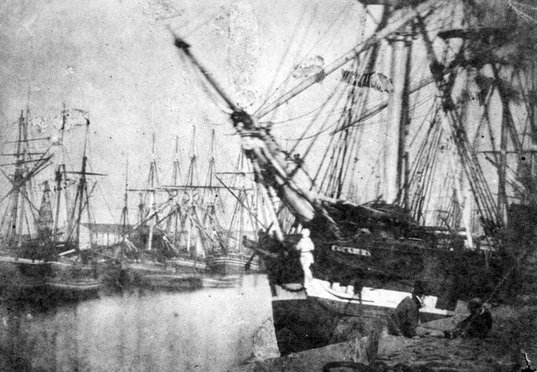On 10 August 1857, William sailed as part of a crew of 21 on the ship "Wallace" of Leith from the Clyde headed for Quebec laden with coal. On 14 November "Wallace" set sail from Quebec planning to return to Greenock with a cargo of timber. However, by early December (as the Newcastle Journal of 2 January 1858 reported) "a gale of wind came on, and continued with little intermission,until the 7th instant, when the ship was about 800 miles from Cape Clear" (Ireland). "...while the hands were at work at the pumps, a tremendous sea struck the ship and capsized her, the crew having to crawl up the lanyards to escape being drowned. After great exertions, they cut away the lanyards, when the main and mizen masts fell. The ship shortly after righted, when another sea struck the bowsprit, carried it away, and also the foremast, at the same time sweeping the deck of all that was left, and also washing overboard Mr Lindsay, the chief officer, and the steward."
The report continues...
"The remainder of the crew held on by the wreck all the afternoon, night and part of the next day, when the gale abated. On the 8th they were able to ascertain that the hatches and deck had been forced up, the poop cabin cleared of its contents, and that not a morsel of provisions was to be obtained. The weather having further moderated, the crew cut away the wreck from the ship's side and made further search for food. Ultimately, a couple of casks of water were discovered, in the fore-hold, and half a bucket of biscuit, but on the 9th a sea stove in the water cask, and thus they lost what the men were craving."
"On the 10th, the poor fellows had become greatly exhausted, from hunger, thirst, cold and wet - their sufferings can be more readily imagined than described. No vessel had hove in sight and their hunger became of that character they could "eat anything", when it was determined to kill and divide the dog, which was done, a small portion being consumed by each, uncooked, for they could obtain no fire. On the 11th, and succeeding days, showers of rain fell, and the poor fellows managed to catch a small quantity, but not sufficient to allay their parching thirst, while small bits of their once favourite dog were the only food they had from the 7th to the 17th December, on which day the joyful cry of "a sail" was given."
The surviving crew members were picked up by the "Colina", upon which Captain Robins and his men provided kindness and care, while dealing with their "ravenous" appetites. Sadly, one of the crew of the "Wallace", an apprentice, who had been "insensible" when taken of the wreck, died shortly afterwards. The "Colina" arrived in the Mersey on the night of 23 December. Six of the wreck survivors were conveyed to the Sailor's Home in Liverpool, while others including the Captain by name of Cormie were too ill to leave the "Colina" immediately, due to "swollen feet &tc".
The death of William Lindsay, the Chief Officer on the fateful journey, was registered in April by the Captain of the Wallace, James Cormie. Captain Cormie also registered the deaths of the other casualties, including steward James Casey. In between the incident and the reporting of it, William Lindsay's wife Euphemia had given birth to her seventh child on 20 December 1857 in Lundin Mill. Below is the newspaper notice of William's death (7 Jan Fife Herald) and also the entry from the case book of midwife Margaret Bethune recording the birth of Wilhemina Lindsay, the youngest of William's children. View Bay Cottage, home of the Lindsays, stood at the top end of Hillhead Lane where it had a commanding view of the sea (and still does, though now renamed).



 RSS Feed
RSS Feed
